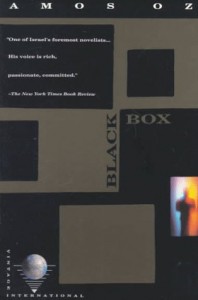 In the wake of an airplane crash, the immediate priority – after the rescuing of possible survivors – is recovery of the flight recorder, or “black box,” a small device that records, at seven second intervals, various information about the aircraft, including the inputs of the pilots. Flight recorders provide a kind of retrospective account of what has led to the devastation, and therefore, it is hoped, the information needed to avoid future mistakes. There are no airplane crashes in Amos Oz’s Black Box, but there has been much devastation following the divorce of Ilana Brandstatter and Alec Gideon. Ilana is chronically unfaithful and Alec, eager for revenge, has denied paternity of their son, Boaz, and refused to take the tissue tests necessary to prove his fatherhood. Ilana quickly takes up with another man, the pious Michael Somo, and shortly thereafter conceives a second child. Seven long years pass without a word between the one-time couple but the silence is broken by Ilana when their shared son falls into delinquency.
In the wake of an airplane crash, the immediate priority – after the rescuing of possible survivors – is recovery of the flight recorder, or “black box,” a small device that records, at seven second intervals, various information about the aircraft, including the inputs of the pilots. Flight recorders provide a kind of retrospective account of what has led to the devastation, and therefore, it is hoped, the information needed to avoid future mistakes. There are no airplane crashes in Amos Oz’s Black Box, but there has been much devastation following the divorce of Ilana Brandstatter and Alec Gideon. Ilana is chronically unfaithful and Alec, eager for revenge, has denied paternity of their son, Boaz, and refused to take the tissue tests necessary to prove his fatherhood. Ilana quickly takes up with another man, the pious Michael Somo, and shortly thereafter conceives a second child. Seven long years pass without a word between the one-time couple but the silence is broken by Ilana when their shared son falls into delinquency.
The novel begins with that first communication, a letter from Ilana to Alec, and never abandons this mode of narration; we hear from Alec and Ilana, their son Boaz, Ilana’s second husband Michael, and Alec’s long-time friend and lawyer Manfred Zakheim, always in the form of epistles. But what threatens to be a domestic affair is given political weight by the characters’ various backgrounds: Alec Gideon is the son of one of Israel’s earliest settlers, whereas his competition for the affections of Ilana, Michael Somo, is a Sephardic Jew, born in Algeria and educated in Paris. Alec is a respected academic and author, wealthy and secular, whereas Michael is poor and pious, the sort of man whose every sentence is punctuated by “It is written.” Alec has largely repudiated his religious ties to Israel and has written a book denouncing fanaticism; Michael is working as a teacher but devoting large amounts of his time and money to a peaceful nationalist group seeking to lawfully purchase land from Arab settlers to Israel. Aside from their shared love of Ilana, the only thing the two men have in common is pride, but we as readers are meant to perceive in their conflict the greater struggle for the soul of Israel, with neither alternative appearing particularly attractive.
Oz does a wonderful job constructing his characters from their letters, with the sole exception of Ilana, whose motives never seemed intelligible, perhaps even to her. This is no small criticism, for a love triangle can only be compelling provided each of its members is credible in their behavior. Then there is the son, Boaz, whose youthful delinquency morphs into an adolescent advocacy for “live and let live” that results in him living on a kind of commune (financed by Alec) on which all are welcome, provided they help grow food and do chores. Ultimately, Michael, whose religious convictions and fragile ego are intricately intertwined, and Alec, whose malevolence is tempered by cancer, are the book’s most compelling characters, and, in both its grand aims – the dissection of a divorce and the political allegory – the novel’s execution falls short of its ambition. And yet I am loath to pronounce it a failure, if only because Oz aims so high that, even missing the mark, the result is compelling fiction.